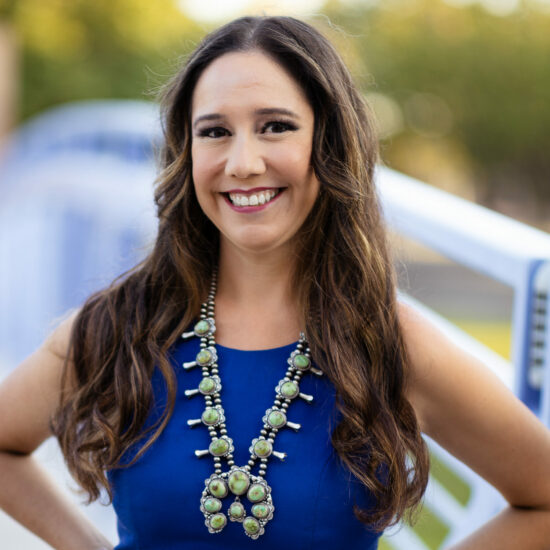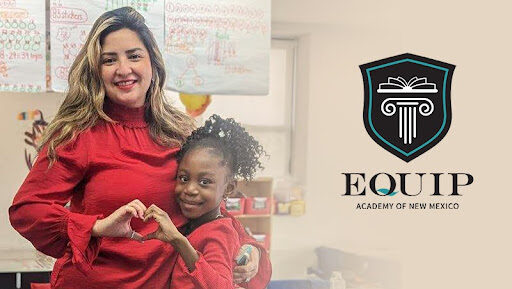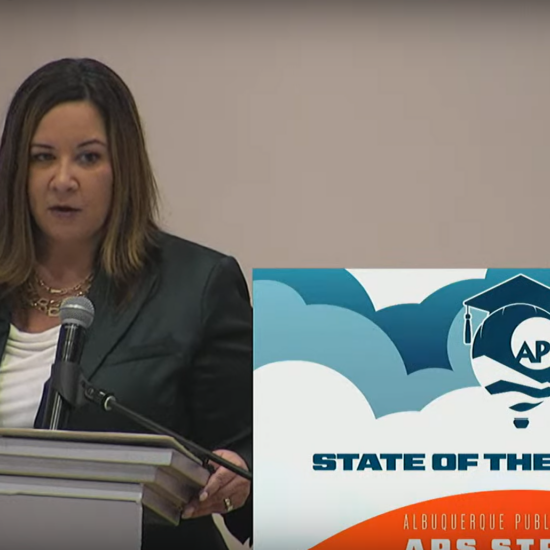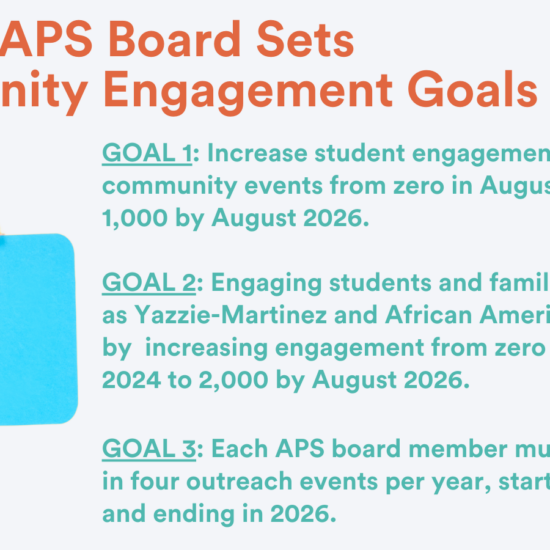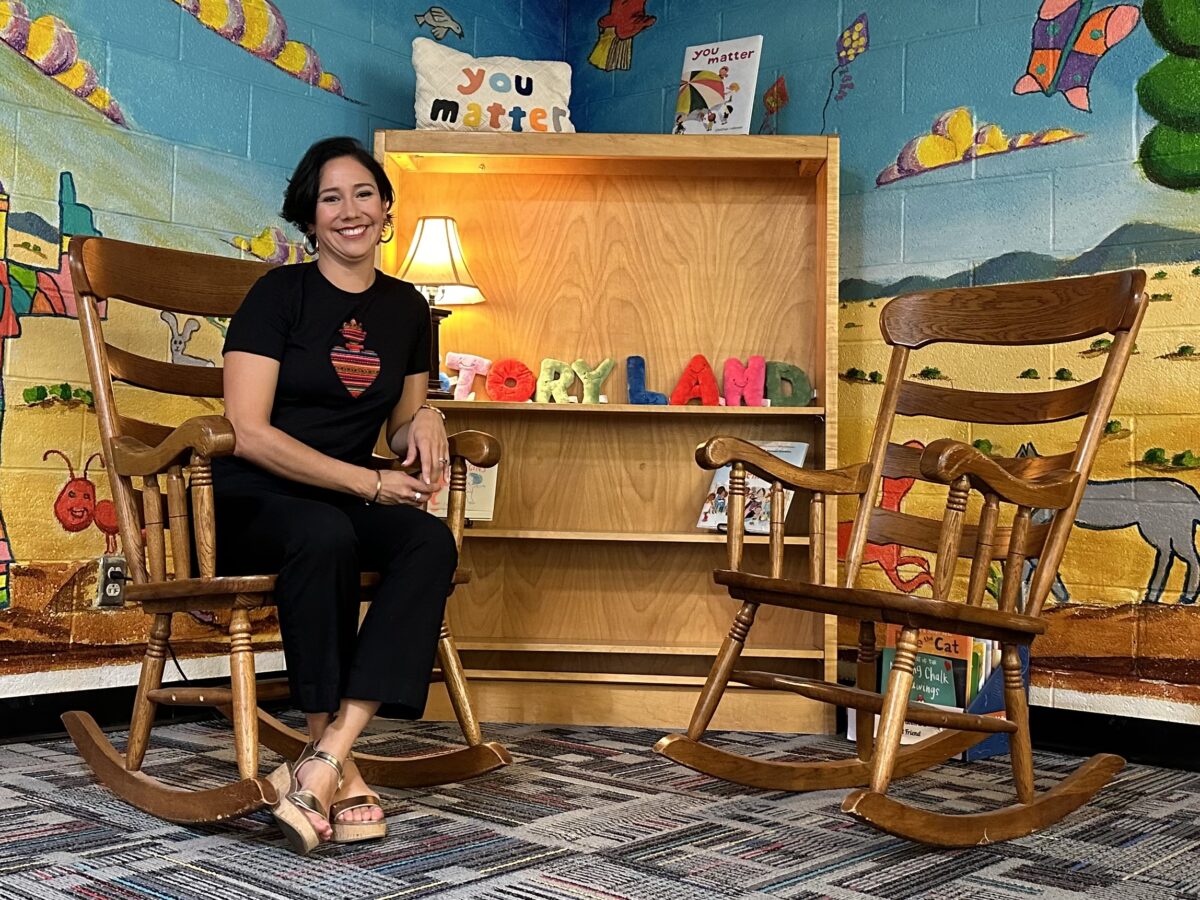
As the President of the Albuquerque Public Schools (APS) Board of Education, Danielle Gonzales stands at the forefront of a transformative era in New Mexico’s largest school district.
With a background deeply rooted in Albuquerque’s North Valley and a career that spans from the classroom to the corridors of power in Washington, D.C., Gonzales brings a unique blend of personal commitment and professional expertise to the challenges facing APS today.
A Personal Journey with Deep Roots in the Community
Danielle Gonzales’s connection to Albuquerque is more than just professional—it’s personal.
Born and raised in the North Valley, Danielle attended Cochiti Elementary, a school that recently welcomed 55 new students from the neighboring Duranes Elementary, which is being repurposed. This expansion marks a period of growth for the school, with the addition of six new classrooms dedicated to art, music, and other specialized subjects.
“This place is a treasure of the North Valley,” Gonzales shared during a recent visit to the school. The buildings and corridors may look different, but her passion remains the same.
Sitting around a reading pit in Cochiti’s library, Gonzales shared fond memories of walking to school with her grandfather, a World War II prisoner of war. “He taught me about the value of community and the importance of giving back, which has stayed with me throughout my life,” Gonzales said.
Gonzales’s journey into education was also deeply influenced by her brother’s experiences. Growing up, she witnessed firsthand the stark differences in the paths their lives took, despite being raised in the same household. While Gonzales thrived in school, her brother struggled. Starting in elementary school, he faced repeated suspensions and disciplinary actions, eventually dropping out of high school and following a path that led to time in jail and living on the streets.
These experiences were a stark reminder to Gonzales that the systems meant to support students often fell short, particularly for those most in need.
“We were in the same family, went to the same schools, but our lives diverged dramatically,” Gonzales said. “It wasn’t just about personal responsibility—there were systemic issues at play. That’s why I got into education, to make sure what happened to my brother doesn’t happen to more kids, but what happened to me does.”
Today, Gonzales cares for her niece, along with her three children, all of whom attend APS charter schools.
This personal mission drove Gonzales to work on the front lines of education, from teaching on the U.S.-Mexico border to engaging in education policy at the national level.
From the Classroom to the Boardroom
Gonzales’s journey into education was driven by a desire to address systemic inequities she witnessed firsthand.
After earning her degree at George Washington University and spending time in Washington, D.C., she returned to the classroom, teaching on the U.S.-Mexico border. It was here, in the aftermath of the 9/11 tragedy, that she became acutely aware of the challenges faced by Hispanic and Latino students, particularly those living in poverty.
“I wanted to make a difference for Hispanic and Latino kids,” Gonzales explained. Her experience on the border reinforced her belief in the importance of addressing the school-to-prison pipeline and the systemic barriers that many students of color face.
After teaching on the border, Gonzales returned to Washington D.C. where she would spend the next 20 years in education policy, learning and developing strategies to improve student achievement and supporting large urban school districts.
Her commitment to equity has been a driving force throughout her career, leading her back to Albuquerque in 2020 and ultimately to her role as APS Board President only four years later.
Under Gonzales’ leadership, APS has embarked on a path of strategic growth and systemic change. The district, once home to 90,000 students, has seen its enrollment decline to around 66,000, prompting difficult but necessary decisions about right-sizing and resource allocation. This process, led by Superintendent Gabriella Durán Blakey, who previously served as APS’s Chief Operations Officer, has been conducted with what Gonzales called meticulous care and community input.
“We’re not just picking schools to close or repurpose at random,” Gonzales emphasized. “There’s a method, a huge intentionality behind these decisions, all grounded in data and community needs.”
The right-sizing efforts, while challenging, are aimed at ensuring that students receive the highest quality education possible, with resources being directed to where they are most needed.
As the district was working to ensure its resources were being used as effectively as possible, the board was working on a strategic plan for the district. This plan encompasses four goals and five guardrails which were intentionally designed after significant community feedback to improve student achievement and proficiency in reading and mathematics, life skills, and post secondary success.
Central to Gonzales’s vision for APS is the belief that educational equity is not just a goal, but a necessity.
The district’s first two goals, set by the community, focus on improving outcomes for Native American, Hispanic, Black, and other underserved students. These goals are not about excluding other students but ensuring that those who have historically been underserved receive the support they need to succeed.
“Our work is guided by the understanding that when we improve outcomes for our most vulnerable students, we lift all students,” Gonzales said. “This is about equity, not equality. It’s about giving each student what they need to succeed.”
The Yazzie-Martinez lawsuit, which highlighted the state’s failures in educating these groups of students, has been a catalyst for APS’s focus on culturally and linguistically responsive education. Gonzales and the board have made it clear that providing students with an education that honors their heritage and language is a non-negotiable standard.
Ensuring schools and students that need the most support get that support has required a particular focus from APS. Gonzales said the district is introducing a new performance framework that tiers schools based on student outcomes, attendance, and other key indicators. Schools requiring the most support receive additional resources, such as community school coordinators and increased administrative attention.
“Every decision we make is student-focused,” Gonzales stated. “It’s about ensuring that every child in our district has the opportunity to succeed, regardless of where they start.”
However, Gonzales acknowledges that this work is not without its challenges. The changes being implemented require a shift in thinking and a commitment to transparency. “Our families deserve to know what’s going on,” she said. “If a school is only two percent proficient in math, that’s something parents need to be aware of. Transparency is key to building trust and driving improvement.”
A Vision for the Future of APS
As APS embarks on a new school year, Gonzales is optimistic about the district’s future.
Gonzales said alignment between the board, the superintendent, and the community is stronger than ever, and with the strategic plan in place to guide the district’s efforts, they will soon see positive results for the whole community.
“I’m really optimistic because this work is so personal for me,” Gonzales shared. “We’ve done the work of aligning our goals with the community’s values, and we’re holding ourselves accountable. I believe we’re on the right path, and I’m excited to see where we’ll be at the end of the school year.”
Balancing her full-time work in education policy with her role on the school board is a task she does not take lightly; she is deeply committed to making a difference in the lives of Albuquerque’s students. Her personal experiences, from raising her brother’s daughter to navigating the complexities of education policy, inform every decision she makes.
“This is my life. This is what I’m committed to,” Gonzales said. “I’m in this for personal reasons, and I’m not going to let noise or criticism distract me from what’s important – helping our students succeed.”
Editor’s Note: You can hear more from Danielle, alongside Superintendent Blakey at the inaugural State of the District event Wednesday August 28, 2024 at 9 a.m. at the Berna Facio Professional Development Center.



